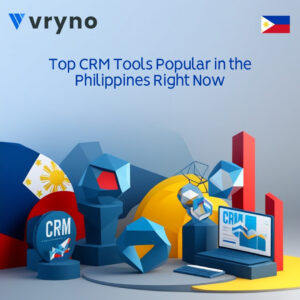Customer Relationship Management (CRM) technology is evolving at an unprecedented pace. From cloud-based solutions to AI-powered insights, CRM software is becoming more intelligent, automated, and integrated than ever before. In 2025, businesses will need to stay ahead of the curve to remain competitive, and that means paying attention to the latest trends shaping the future of CRM. This blog explores the top 5 CRM trends to watch in 2025 and how they will impact customer engagement, operational efficiency, and overall business growth.
1. AI-Powered Automation Will Drive Customer Engagement
In 2025, Artificial Intelligence (AI) will continue to revolutionize CRM systems. AI-powered automation is already transforming how businesses interact with customers, and this trend will become even more pronounced. As businesses shift towards a more data-driven approach, AI will be at the forefront of customer engagement, providing real-time insights, automating routine tasks, and offering personalized customer experiences.
Key Features of AI-Powered CRMs:
- Predictive Analytics: CRM systems will use AI to predict customer behavior and preferences, allowing businesses to anticipate needs and proactively engage customers.
- Automated Workflows: AI will streamline tasks such as email marketing, lead scoring, and customer support, freeing up valuable time for sales teams.
- Chatbots and Virtual Assistants: AI-powered chatbots will become more intuitive, handling customer inquiries and providing instant support around the clock.
Why It Matters:
Businesses that embrace AI-powered CRM will be able to deliver personalized customer experiences at scale. This not only boosts customer satisfaction but also increases retention and drives sales growth. AI will enable businesses to optimize their sales pipelines by focusing on high-value leads, making it easier to close deals and increase revenue.
Popular CRM systems such as Salesforce, HubSpot, and Vryno are already integrating AI features, and this will become a standard expectation across all CRM platforms by 2025.
2. Hyper-Personalization Will Become the Norm
As customer expectations rise, personalization is no longer just a nice-to-have feature—it’s a necessity. In 2025, CRM systems will focus on hyper-personalization, leveraging vast amounts of customer data to deliver tailored experiences for each individual.
What is Hyper-Personalization?
Unlike traditional personalization, which involves segmenting customers into broad categories, hyper-personalization uses advanced analytics to tailor every aspect of customer interaction. This can range from personalized product recommendations to customized marketing messages based on real-time behavioral data.
Key Trends in Hyper-Personalization:
- Real-Time Customer Insights: CRM systems will analyze data from multiple touchpoints in real time, allowing businesses to adjust their strategies on the fly.
- Personalized Marketing Campaigns: Automated systems will send targeted messages based on individual customer preferences, improving engagement rates.
- Tailored Customer Support: Customer service interactions will be personalized to reflect past interactions, preferences, and issues, enhancing the overall experience.
Why It Matters:
Customers are more likely to engage with businesses that understand their needs and offer tailored solutions. In 2025, businesses using CRM systems capable of hyper-personalization will see significant improvements in customer loyalty and conversion rates. Popular CRM systems like Zoho CRM, Vryno Connecktly, and Microsoft Dynamics are expected to lead the charge in this trend by offering advanced personalization features.
3. Integration with IoT Devices Will Expand Customer Data Insights
The Internet of Things (IoT) has been a buzzword for several years, but its integration with CRM systems will truly take off in 2025. As more devices become connected, businesses will have access to a wealth of new customer data that can be seamlessly integrated into their CRM platforms.
How IoT and CRM Will Work Together:
- Connected Devices and Wearables: CRM systems will collect data from a variety of IoT-enabled devices, including smart home products, wearables, and vehicles. This data will provide insights into customer behavior and preferences, enabling businesses to offer more personalized experiences.
- Proactive Customer Service: With real-time data from IoT devices, businesses will be able to predict when customers might need service or maintenance, allowing them to offer proactive support.
- Improved Product Development: IoT data can help businesses understand how customers are using their products, leading to better product development and more effective marketing strategies.
Why It Matters:
IoT integration with CRM systems will give businesses unprecedented visibility into customer behaviors. By leveraging this data, businesses can offer more relevant products and services, improve customer satisfaction, and gain a competitive edge. Popular CRM platforms like Salesforce, Oracle CRM, and Vryno are already exploring IoT integrations, and this trend will become mainstream by 2025.
4. Mobile-First CRM Solutions Will Dominate the Market
In a world where everyone is always on the go, the demand for mobile-first CRM solutions will continue to rise. By 2025, CRM systems that prioritize mobile functionality will dominate the market, allowing businesses to manage customer relationships and sales pipelines from anywhere, at any time.
Key Features of Mobile-First CRMs:
- Mobile-Optimized Interfaces: CRM systems will offer intuitive, mobile-friendly dashboards that provide all the functionality of desktop versions.
- On-the-Go Customer Management: Sales teams will be able to update leads, track opportunities, and close deals from their smartphones or tablets.
- Mobile Notifications: Real-time alerts and notifications will keep teams informed of important customer interactions or changes in the sales pipeline.
Why It Matters:
Businesses that adopt mobile-first CRM solutions will benefit from increased productivity and flexibility. Mobile CRM will be particularly important for small businesses and startups, allowing them to manage customer relationships without being tied to a desk. Popular CRM platforms like Vryno, Pipedrive, and HubSpot are already leading the way in mobile CRM, and by 2025, mobile-first solutions will be a standard feature.
5. CRM Systems Will Prioritize Data Privacy and Compliance
With data breaches and privacy concerns making headlines, data security will be a top priority for CRM systems in 2025. As governments continue to introduce stricter data protection regulations, CRM platforms will need to prioritize data privacy and compliance to maintain customer trust.
Key Data Privacy Features to Expect:
- Enhanced Encryption: CRM systems will offer advanced encryption methods to protect customer data from unauthorized access.
- Compliance with Global Regulations: Popular CRM platforms will provide built-in compliance tools for GDPR, CCPA, and other data protection regulations, ensuring that businesses can handle customer data securely and legally.
- Data Access Controls: CRM platforms will offer granular data access controls, allowing businesses to restrict access to sensitive customer information based on user roles.
Why It Matters:
In 2025, customers will be more aware of their data privacy rights than ever before. Businesses that fail to comply with data protection regulations risk losing customer trust and facing hefty fines. Popular CRM systems like Vryno, Zoho, and Microsoft Dynamics will offer robust data privacy features, making them the go-to solutions for businesses focused on compliance.
Conclusion: The Future of CRM is Here
The CRM landscape is set to undergo significant changes in 2025, with AI-powered automation, hyper-personalization, IoT integration, mobile-first solutions, and data privacy taking center stage. Businesses that adopt these trends will be better positioned to engage customers, streamline operations, and grow their bottom line.
As these trends continue to evolve, choosing the right CRM platform will be critical. Popular CRM systems like Vryno Connecktly, Salesforce, and HubSpot are already incorporating these features, making them the top choices for businesses looking to stay ahead of the competition.
Investing in a forward-thinking CRM system is no longer an option—it’s a necessity. Stay ahead of the curve by adopting a CRM that embraces the latest technology and trends, and position your business for success in 2025 and beyond.






